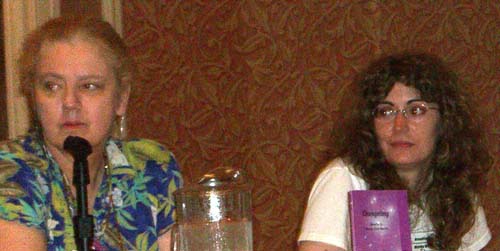This panel was at 10 am, so of course, I was late. By the time I arrived 20 minutes late, the panelists seemed to have finished discussing why they write fantasy and filled in the remaining time chatting about how they do research of medieval weapons, technologies, clothes, customs, etc. for their books. Too bad. I was curious why they write it: what inspires them to rehash the same cliched stories over and over again? :-) Just kidding, I did not go into the panel with a snarky attitude. But I didn't hear many original thoughts regarding why they write fantasy, probably because I caught only the trail end of that particular discussion thread.
Sharon Shinn writes it because it's fun. People in fantasy stories get to have adventure. That reminds me of an opinion expressed by, I think, John Cramer through one of the characters of his book "Einstein's Bridge": mainstream literature is about losers in the process of losing. Mainstream literature talks mostly about how awful life is. On the other hand, in science fiction and fantasy people get to solve problems and come out a winner. Actually, Sharon Shinn said something like that in her Guest of Honor interview at the last year's ArmadilloCon.
Nancy Jane Moore said something about how fantasy gives you more choices that "hard science" fiction. This reminds me of the saying that science fiction differs from fantasy in that in fantasy, dragons can fly, while in science fiction they can't. While I appreciate the irony, I don't subscribe to this opinion. But anyway, this panel wasn't about my opinions.
Some of the more interesting comments in the panel were about literary style. Nancy Jane Moore says in a lot of high fantasy literature the language feels last week. So it is even more impressive to find an author -- and she gave an example of one, but I didn't hear the name -- whose language and style in general feels like the 18th century in which his novel is set; except it moves a lot faster than 18th century novels, which take forever to get the plot going.
Martha Wells says a writer needs to get into the mentality prevalent in the certain historical and geographical setting where the story is set. For example, her friend wrote a story where a medieval crime investigator works with forensics. They didn't do that in the Middle Ages. Rather, they would just go and arrest all the gypsies, or some group which was thought to be criminal.

Nancy Jane Moore (left) and Martha Wells. Here are more posts from ArmadilloCon 2005.




No comments:
Post a Comment